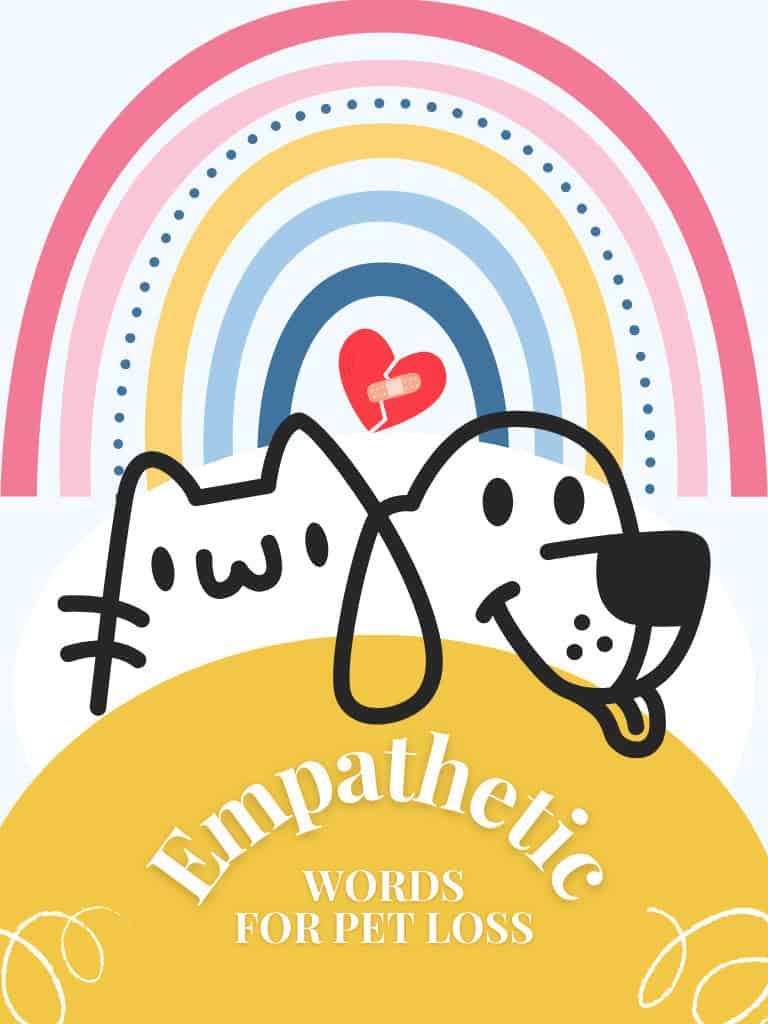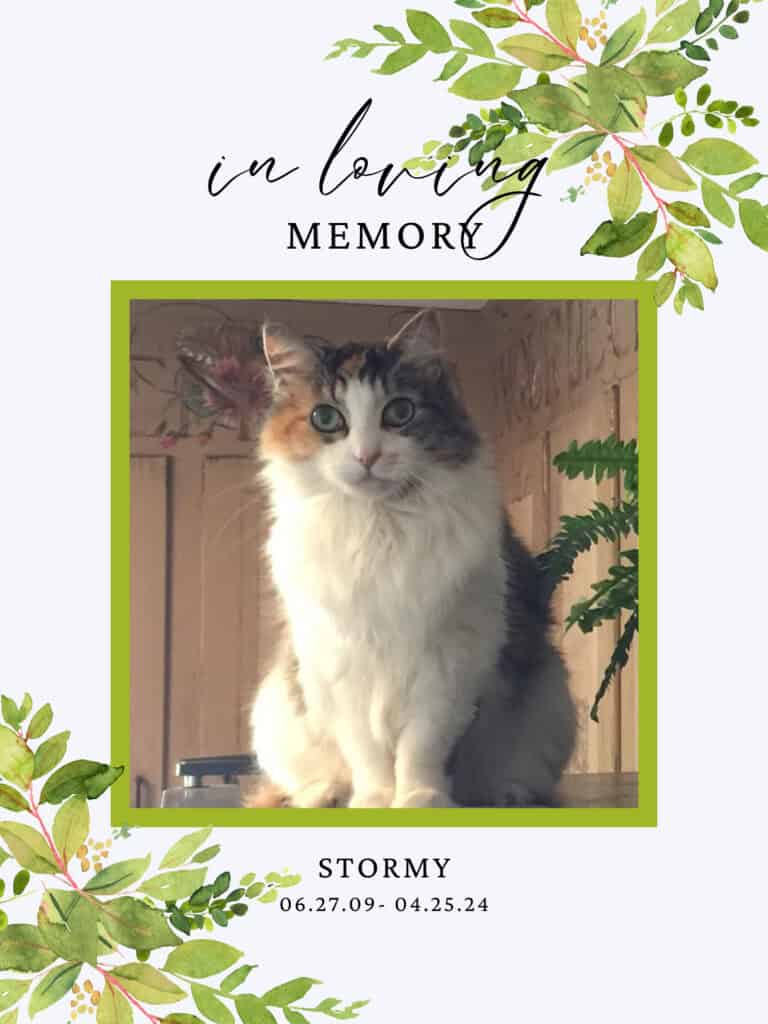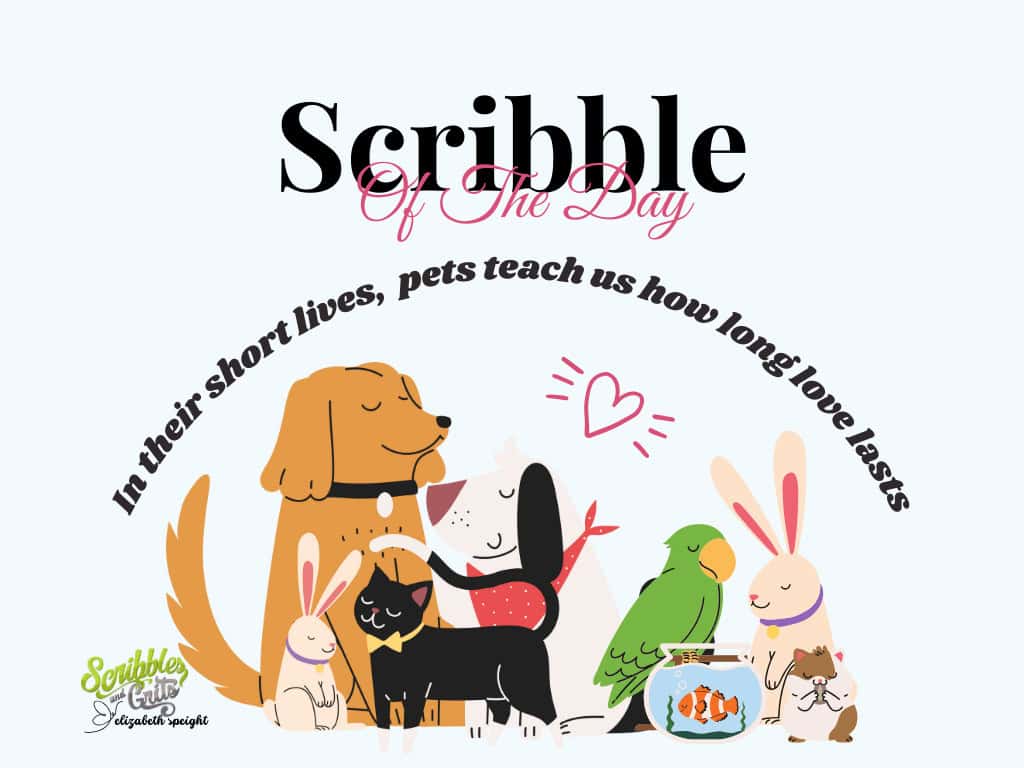What to Say When Someone Loses a Pet: Comforting Words from Personal Experience
Recently, I faced the heartbreaking loss of my beloved calico cat, Stormy, who had been a cherished part of my life for 15 years.
The quiet after she passed was (and continues to be) overwhelming, a reminder of the significant loss I have been experiencing.
Navigating pet grief is incredibly challenging, and finding the right words to know what to say when someone loses a pet can feel just as daunting.

It’s difficult to know how to express sympathy in a way that truly honors the unique bond between a pet and their owner, so in this post, I aim to share not only my personal experience but also provide guidance on “what to say to someone you care about who is grieving the loss of their pet”.
Let’s explore compassionate and supportive ways to communicate our love and empathy, helping to comfort those who are navigating this difficult journey.
Key Takeaways
- Loss of a pet is an emotional event equivalent to losing a part of oneself.
- Comforting words should be genuine, acknowledging both the pain and the bond shared.
- The importance of recalling happy memories to celebrate the life of the beloved pet.
- Offering support can come in many forms; presence often speaks louder than words.
- Every gesture of compassion helps to weave a tapestry of comfort and understanding.
What to Say When Someone Loses a Pet
Knowing what to say when someone loses a pet shows kindness and understanding.
In my own experiences of pet loss, I’ve learned how to offer comfort in ways that truly acknowledge someone’s pain.

Here are some specific phrases and sentiments that can provide comfort, along with explanations of why they are soothing:
Heartfelt Condolences
- “My heart goes out to you in your time of loss.”
- Why it helps: This simple expression of sympathy acknowledges the grief without minimizing the loss, showing recognition of their significant pain.
- Example: When my neighbor lost her beloved Labrador, I approached her and said, ‘My heart really goes out to you in your time of loss. I know how much Bella meant to you.'”
- “[Pet’s Name] was such a wonderful part of your life.”
- Why it helps: This phrase honors the pet’s importance and acknowledges the unique place they held in the family.
- Example: At my friend’s pet memorial, I shared, ‘Bailey was such a wonderful part of your life, always bringing joy and comfort.'”
- “Allow yourself as much time as necessary to heal; remember, there’s no timetable for grief.”
- Why it helps: It validates feelings and the time it takes to heal, emphasizing that grief is a personal process.
- Example: During a phone call with a grieving friend, I reminded her, ‘Please allow yourself as much time as necessary to heal. Remember, there’s no timetable for grief.’
- “I’m here for you if you need to talk or need some quiet company.”
- Why it helps: Offering to be there as a source of support lets others know they aren’t alone in their grief.
- Example: After the loss of Stormy, my pet sitter (who’s become a close friend), Linda, sent flowers. The card read, ‘If you need to talk or just want someone to sit with you, I’m here.’
- “What a special bond you and [pet’s name] shared.”
- Why it helps: Acknowledging the unique relationship between the person and their pet highlights the depth of their connection.
- Example: At a gathering, a friend commented, ‘What a special bond you and Stormy shared. She was truly your loyal companion.’
- “It’s okay to feel a range of emotions during this time.”
- Why it helps: Recognizing the complexity of grief validates their experience, letting them know it’s normal to feel a mix of sadness, anger, or even relief.
- Example: When comforting me my sister said, ‘It’s completely okay to feel a range of emotions during this time. Grieving is very personal.’
- “May your heart find peace and comfort in cherished memories.”
- Why it helps: Encouraging reflection on happy moments shared with their pet can provide solace amidst the pain of loss.
- Example: In a condolence card, someone wrote, ‘May your heart find peace and comfort in all the cherished memories you gathered with Stormy.’
- “Wishing you strength and comfort in this tough period.”
- Why it helps: Expressing care and support reminds them that they are surrounded by love, even in their darkest moments.
- Example: Sending a text to a friend who recently lost her pet, I wrote, ‘Wishing you strength and comfort during this tough period.
Condolences Rooted in Faith
- “God is close to the brokenhearted; He comforts those who mourn.”
- Why it helps: Offering a reminder of God’s presence and comfort can provide spiritual reassurance in times of grief.
- Example: Sharing this verse with a friend who lost their pet can offer a sense of divine solace amidst their sorrow.
- Bible Verse: Psalm 34:18 – “The Lord is close to the brokenhearted and saves those who are crushed in spirit.”
- “I’m praying for God’s peace to surround you during this difficult time.”
- Why it helps: Letting them know you’re lifting them up in prayer invites divine intervention and support.
- Example: Offering prayers for a neighbor who lost their pet can convey a sense of spiritual solidarity and support.
- Bible Verse: Philippians 4:7 – “And the peace of God, which transcends all understanding, will guard your hearts and your minds in Christ Jesus.”
- “May you find comfort in knowing that God cares for every creature, and your pet was no exception.”
- Why it helps: Affirming God’s care for all creation can bring reassurance that their pet is in loving hands.
- Example: Sharing this sentiment with a grieving friend can offer a perspective rooted in faith, reminding them of God’s compassion.
- Bible Verse: Matthew 10:29 – “Are not two sparrows sold for a penny? Yet not one of them will fall to the ground outside your Father’s care.”
- “May the hope of reunion in heaven bring you comfort in this time of sorrow.”
- Why it helps: Offering the assurance of an eternal reunion can provide hope and consolation amidst grief.
- Example: Expressing this sentiment to a family member who lost their pet can offer a perspective of faith-based comfort.
- Bible Verse: Revelation 21:4 – “He will wipe every tear from their eyes. There will be no more death or mourning or crying or pain, for the old order of things has passed away.”
- “Even in our sorrow, God is our refuge and strength, a very present help in trouble.”
- Why it helps: Reminding them of God’s steadfast presence and support can offer strength and resilience in times of sorrow.
- Example: Sharing this verse with a loved one who is grieving the loss of their pet can provide a sense of divine comfort and security.
- Bible Verse: Psalm 46:1 – “God is our refuge and strength, an ever-present help in trouble.”
What Not to Say When Someone You Know Loses A Pet
Certain comments can unintentionally deepen the pain of losing a pet, turning a moment meant for empathy into one of discomfort.

Below are some phrases to avoid and thoughtful alternatives that can be more supportive, ensuring your words provide solace rather than sorrow.
Phrases to Avoid
- “You can always get another cat.”
- Why it hurts: Suggests that the pet was replaceable and diminishes the unique bond shared.
- Alternative: “I know how special [Pet’s Name] was to you. They were truly one of a kind.”
- “At least they had a good life.”
- Why it hurts: While meant to offer consolation, it can come across as dismissive of the current grief.
- Alternative: “Your love gave [Pet’s Name] a wonderful life full of happiness. I’m sure they cherished every moment with you.”
- “It’s just a pet.”
- Why it hurts: Minimizes the relationship and the valid grief that comes with the loss.
- Alternative: “Pets are not just animals; they are family. It’s clear how much [Pet’s Name] meant to you.”
- “Be strong.”
- Why it hurts: Implies that showing emotion or feeling devastated is a sign of weakness.
- Alternative: “It’s okay to feel sad; you’re not alone in this. I’m here for you, no matter what.”
- “They’re in a better place now.”
- Why it hurts: While well-intentioned, it may not provide comfort and can invalidate the owner’s grief.
- Alternative: “It’s natural to miss them; their memory will always be with you, bringing comfort and love.”
- “It’s time to move on.”
- Why it hurts: Rushes the grieving process and disregards the depth of the owner’s bond with their pet.
- Alternative: “Take all the time you need to heal; your pet will always hold a special place in your heart.”
Christian Phrases to Avoid
- “It was God’s plan.”
- Why it hurts: May come across as dismissive of the pet’s importance and the depth of the owner’s grief.
- Alternative: “God understands our sorrow and is with us in our pain. Let’s lean on His love together.”
- “Time heals all wounds.”
- Why it hurts: While intended to offer hope, it may seem dismissive of the current pain and grief.
- Alternative: “In time, may God’s comfort and grace bring healing to your heart, one day at a time.”
- “It’s just an animal, not a person.”
- Why it hurts: Dismisses the deep bond and love between the owner and their pet.
- Alternative: “Your pet was a cherished member of your family, blessed by God, and your love for them is valid and real.”
- “You shouldn’t feel so sad; it’s just a pet.”
- Why it hurts: Invalidates the owner’s feelings and diminishes the significance of their loss.
- Alternative: “Your grief is a testament to the love you shared, and it’s perfectly okay to mourn your beloved pet. Remember, God is close to the brokenhearted.”
- “God needed another angel.”
- Why it hurts: Can feel dismissive and may not resonate with the owner’s beliefs about pets.
- Alternative: “May God’s love surround you in this time of loss, bringing comfort and peace to your heart.”
- “It’s time to find a new pet.”
- Why it hurts: Rushes the grieving process and fails to acknowledge the uniqueness of the bond with the lost pet.
- Alternative: “When you feel it’s time, God will guide you to a new companion. Until then, it’s okay to mourn and cherish the memories of your beloved pet.”
Understanding the Impact of Pet Loss
The sadness experienced after the loss of a pet can often follows the stages of grief, which help us understand and put into context the feelings that may come and go unpredictably.
Here’s a breakdown of each stage, along with examples from my journey of losing Stormy, which might resonate with those who have been through similar losses:
The Stages of Pet Grief
From a Christian perspective, grief is understood as a natural response to loss, even the passing of a beloved pet, considered part of God’s creation.
Some Christian perspectives suggest that there is no need to feel embarrassed or guilty for grieving a pet, as all of God’s creatures are valued and cherished.
Understanding these stages can help pet owners recognize that their feelings are normal and that they are not alone in their grief.
The “silent void” left by our pets is not just a physical emptiness, but an emotional landscape that we navigate as we heal.
The Emotional Significance of Pets in Our Lives
In the cozy corners of our homes, pets are not merely pets; they are family, dear friends, and steadfast companions. They grace our lives with unconditional love and pure joy, making our homes livelier and our hearts fuller.

It’s this profound emotional connection that explains why the loss of a pet can echo so deeply in our souls, akin to losing a part of our very own story.
Research confirms what every pet owner feels in their heart: our furry friends do more than keep us company. They significantly boost our well-being.
Studies showcased by organizations like the Human-Animal Bond Research Institute illustrate that pets play a crucial role in reducing stress, bolstering our emotional resilience, and alleviating feelings of loneliness.
Engaging in mutual gazes with our pets isn’t just an exchange of affection; it triggers an increase in oxytocin levels, known as the “love hormone,” which also strengthens human bonds.
This scientific insight sheds light on the profound sense of loss when a pet is absent. Discover more about the impacts of pets on mental health through this HABRI research.
Comparing Pet Loss to Losing a Family Member
Experiencing the loss of a pet is akin to losing a cherished family member, deeply felt by those who treasured their companionship and unwavering affection.

Our pets are more than animals; they are integral parts of our families, whose presence is interwoven with our daily lives and emotional well-being.
The emotional journey through the loss of a pet mirrors the grief process of losing a human loved one, complete with its complex stages including denial, anger, and acceptance
For an in-depth understanding of the societal challenges faced by individuals grieving the loss of a pet, you can refer to the insights discussed in the Journal of Loss and Trauma.
This publication stresses the urgent need for our society to extend the same level of compassion and recognition to pet bereavement as is typically reserved for the loss of human family members.
Recognizing and supporting this form of grief not only acknowledges the valid emotional pain experienced but also fosters a more compassionate community.
You can read more about these findings to understand how significant societal support can be in these deeply personal moments.
Recognizing the Grieving Process Following the Loss of a Pet
When someone loses a beloved pet, the grief they experience can be profound and deeply personal.

As friends or family members trying to provide support, it’s essential to approach the situation with sensitivity and understanding. Here are some ways to offer meaningful support:
- Empathize Rather Than Sympathize: Focus on showing empathy by acknowledging how significant the pet was in their life. This approach helps to communicate a deep understanding of the loss, which is more comforting and personal than a standard expression of sympathy.
- Be a Compassionate Listener: Sometimes, the best way to support someone is by simply being there and listening. Allow them to share their feelings and memories of their pet at their own pace. Resist the urge to divert the conversation to your experiences; focus on their need to express grief.
- Offer Specific Assistance: Make concrete offers of help instead of general statements. You could say, “Can I bring dinner over tomorrow night?” or “Would you like some company this weekend?” Such specific offers can make it easier for the grieving person to accept help.
- Respect Their Way of Grieving: Understand that each person’s grieving process is unique. Avoid suggesting that they should be feeling better by a certain time or pushing them to adopt a new pet prematurely. Respect their timeline and support them in finding their path to healing.
Personal Anecdotes of Pet Loss
Reflecting on the day I had to say goodbye to my dear Stormy, I’m reminded of how deeply a pet weaves into the very fabric of our lives.
It forever changed my understanding of grief and loss. Every little memory of Stormy—from her playful antics to her comforting purrs—is a treasured part of my family’s story.

Talking about Stormy isn’t easy, but it helps me heal.
Sharing her stories has also brought comfort to friends who’ve experienced similar losses. They, too, recognize that a pet is unquestionably a family member.
Their empathy and kind words have been a balm to my soul, reminding me that I’m not alone in this journey.
It’s moments like these—exchanging stories and support—that underscore how blessed we were to have such wonderful companions in our lives.
| Moments with Stormy | Reflections on Loss |
|---|---|
| Her playful antics each morning | A reminder of the vibrancy she brought into life |
| Her comforting presence when I was alone | The palpable absence felt in her favorite hiding spots |
| Her quirky love of “Q-tip throws” or “Toilet Paper” play | Cherished memories provoke both laughter and tears |
That peaceful morning when I had to let Stormy go was heart-wrenching.
The loss of a pet leaves an indescribable emptiness, but sharing these memories with loved ones allows us to celebrate the bond we had.
These pets leave an indelible mark on our hearts, and talking about them, sending a card, or even a simple, heartfelt ‘I’m sorry for your loss’ can mean the world.
Let’s hold each other up, share advice and guidance when we can, and continue to honor their memory by recognizing the profound impact they had on our lives.
In doing so, we not only support each other but also validate the deep emotional significance of our furry family members.
Your Questions, My Answers
My Final Thoughts
As we wrap up, it’s heartbreakingly familiar to hear about someone dear experiencing the loss of a beloved pet, much like when I had to say goodbye to my dear Stormy.
The words, “I’m sorry to hear about your loss,” while simple, are a profound expression of sympathy that touches a loving owner deeply. Sharing these sentiments reminds the bereaved that their feelings are recognized and their precious companions will not be forgotten.
In these tender moments, offering a supportive presence can be the most comforting gesture you can extend to someone whose heart is aching.
Whether it’s through sending a heartfelt condolence card, picking up the phone to say, “I’m here whenever you need to talk or share memories,” or just sitting quietly beside them, your support can be a beacon of comfort.
Remember, each pet holds a special place in our hearts and homes, and acknowledging this bond respectfully can help ease the pain of their passing.
Your kindness and patience during these times show a deep understanding of the loss, ensuring that the memory of their beloved pet is honored with love and empathy.
Scribble Of The Day: Pet Sympathy Quote

If you’ve found solace in these words or know someone navigating the pain of pet loss, please share this article or leave me a comment below!
Let’s spread the comfort further, helping others feel understood and supported during their times of grief. Your share could be the hug someone needs today.







